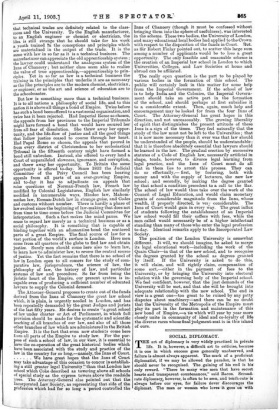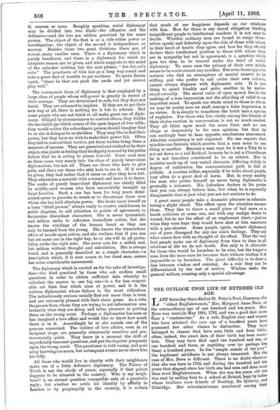SOCIAL DIPLOMACY. T HE art of diplomacy is very widely practised
in private life. It is, however, a difficult art to criticise, because it is one in which success goes generally unobserved, and failure is almost always apparent. The mark of a proficient diplomatist, if we may be allowed the paradox, is that he should never be recognised. The gaining of his end is his only reward. "There be many wise men that have secret hearts and transparent countenances," said Bacon. Second- rate diplomacyi however, is often to be seen, and tenth-rate is always before our eyes, for failure never discourages the diplomat. The man or woman who loves it goes on with it, success or none. Roughly speaking, social diplomacy may be divided into two kinds—the offensive and the defensive—and the two are seldom practised by the same person. The object of the first is as a rule either power or investigation; the object of the second is independence or secrecy. Besides these two great divisions, there are, of course, many smaller ones. There is a diplomacy which is purely beneficent, and there is a diplomacy for which no adequate reason can be given, and which suggests to the mind of the onlooker nothing but the cant phrase, "Art for art's sake." The practisers of this last go a long way round and take a great deal of trouble to get nowhere. To quote Bacon again, "there be that can pack the cards and yet cannot play well."
The commonest form of diplomacy is that employed by a large class of people whose will-power is greatly in excess of their courage. They are determined to rule, but they dare not insist. They are ashamed to implore. If they are to get their own way at all, there is nothing for it but to scheme. But some people who are not timid at all make great use of diplo- macy. Obliged by circumstances to control others, they dislike the inevitable jar which comes of the open impact of two wills ; they would rather the subordinate person should imagine that he or she is doingas he or she likes. They may like to feel their power, but they have no wish to make their power felt. Often they fail to conceal their tactics, yet those tactics bring them a measure of success. They are perceived and winked at by their object, who yieids in feeling that his dignity is saved by the polite fiction that he is acting to please himself. Some such men as these come very nearly into the class of purely benevolent diplomatists, but not all There are those who hate to give pain, and there are those who only hate to see it. If it must be given, they had rather that it came on after they have left. They administer a narcotic with a wound and leave it to fester. The ranks of purely benevolent diplomacy are chiefly filled by middle-aged women who have successfully brought up large families. Such a one has been for long years deter- mined never to provoke to wrath or to discourage those over whom she has held absolute power. She looks upon herself as a born "third person," always ready to receive confidences, to settle disputes, to call attention to points of agreement, to harmonise discordant characters. She is never tyrannical, and seldom seeks to influence immediate action, but she knows the windings of the human heart as they can only be learned from the young. She knows the tremendous effect of moods upon action, and she realises that if you can but set some one in the right key, he or she will in all proba- bility strike the right note. She never acts for a selfish end, but seldom without thought and calculation. She is always loved, and is generally described as a simple character,—a description which, if it ever comes to her tired ears, causes her some considerable amusement.
The diplomacy which is carried on for the sake of investiga- tion—the kind practised by those who ask endless small questions in order to obtain sufficient data whereby to calculate the answer to one big one—is a far less respect- able art than that which aims at power, and it is the curious diplomatist whose failure is the most ridiculous. The industriously curious usually find out more than is true, and are extremely pleased with their sham gains. As a rule, the person from whom they are trying to get information sees instantly what they are doing and takes pleasure in putting them on the wrong scent. Perhaps a diplomatist has seen or has imagined a love affair and would like to know how much there is in it. Accordingly he or she sounds one of the persons concerned. The victims of love affairs, even in an incipient stage, are generally abnormally sensitive and pm- ternaturally quick. They know in a moment the drift of superficially innocent questions, and put the inquirer purposely upon the wrong scent. The questioner is told wrong, and goes away knowing too much, but subsequent events never show him his folly.
All those who would live in charity with their neighbours make use of a little defensive diplomacy. The Palace of Truth is not the abode of peace, especially if that palace happens to be situated in the country. Who is my neigh- bour ? is an eternal question susceptible only of a parabolic reply; but whether we settle his identity by affinity in London or by propinquity in the country, it is certain
that much of our happiness 'depends on our relations with him. How far there is any moral obligation binding insignificant people to intellectual candour it is not easy to decide. Whether ordinary men are bound to range them. selves openly and definitely upon the side of those with whom in their heart of hearts they agree, and how far they should declare their intellectual position to those with whom they are in sympathy but not in agreement, is a question which goes too deep to be treated under the head of social diplomacy. To some men the privacy of their own minds seems to be worth almost any sacrifice. But even those opposite natures who find an atmosphere of mental reserve to be stifling, and who prefer to sail under their own colours, cannot always dispense with diplomatic arts. It is one thing to speak frankly and quite another to be under- stood correctly. The moral value of open speech lies in the making of a true impression, not the affording of relief to as impatient mind. To speak our whole mind to those to whom we may be pretty sure we shall convey a false impression is no virtue. It is simply to transform the truth into a species of expletive. For those who live chiefly among the friends of their choice caution in conversation is not so much needed. They all think upon much the same lines, and no one clings so desperately to his own opinions but that he can smilingly bear to hear opposite conclusions announced. Absolute consistency is not expected. No one repeats that mischievous formula which asserts that a man must be one thing or another. Because a man says he is not a Tory he is not set down as a red Radical, because he is not a Churchman he is not therefore considered to be an atheist. But in societies made up of very varied elements differing widely in degree of cultivation the conversational path is full of pitfalls. A careless talker, especially if he talks about people, may often do a great deal of harm. But in every society the man who prides himself on never being diplomatic is generally a nuisance. His defenders declare in his praise that you can always believe him; but when he is especially disagreeable that is just what you are not anxious to do.
A great many people take a dramatic pleasure in adminis- tering a slight shock. The effect upon the situation amuses them. They like to throw a small piece of bad news or a harsh criticism at some one, not with any malign desire to wound, but to see the effect of an unpleasant stark—just as when they were boys they would have shot at him unawares with a pea-shooter. Some people, again, eschew diplomacy out of pure disregard for any one else's feelings. They say what comes first with no thought of its effect. That the very best people make use of diplomacy from time to time in all relations of life we do not doubt. Not only is it allowable for those who would be harmless to be wise, but the longer a man lives the more sure he becomes that without wisdom it is impossible to be harmless. The great difficulty is to draw a line between wisdom and cunning. As a rule they can be differentiated by the test of motive. Wisdom seeks the general welfare, cunning only a special advantage.







































 Previous page
Previous page